|
Round 29: Featuring Charlie Allen's Charger, Junior Brogdon’s
Phony Pony Mustang, Kip Brundage's Parts Mart Camaro, Ed Carter's Young American Corvette, Barry Kelly's
Machine Gun Kelly Corvair, Ed Lenarth's Holy Toledo Jeep, Bob McFarland's Demon, Clyde Morgan’s
Exp. Javelin AMC Javelin, Tom Sturm's Camaro, and Tom Zedaker's Family Affair Mustang.
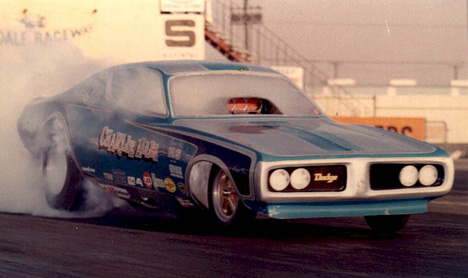
Billed as the “All American Boy,” Charlie Allen was a sponsor and race
promoter’s dream. Charlie backed up that image as one of the toughest
funny car racers of the sixties and early seventies. Allen began his funny
car career with the species' beginnings in Super Stock. In Dodge bodied
cars sponsored by local California dealers, he made the leap to the
altered wheel based factory experimental cars. Allen followed the
progression with a Dodge Polara that finally ran 8.03 with a blower in
1966. The Dodge Dart that Charlie built in 1967 became his most famous
car. A new Challenger replaced it in late 1969.
“The
All American Boy” raced nationwide until 1971 with too may victories to
list here. Allen had this new “Mr. Ed” bodied Charger built in 1971.
Charlie traveled less with this Charger. He did manage to set an NHRA
National Speed Record at 222.22 mph with the car (with a 6.82 elapsed
time) in 1972. Allen retired from racing in 1972 and turned to business.
He ran Orange County International Raceway until its closing in 1983 and
since has run Firebird International in Phoenix. (Photo from Drag Race
Memories; info from Draglist.com files)
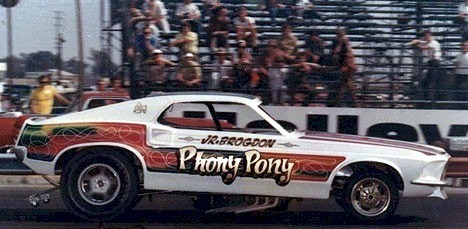
Junior
Brogdon’s series of “Phony Pony” cars will be remembered best for
the wild Mustang mounted on the dragster chassis. The car was a failure,
but its oddity gained it a following in the late sixties in Southern
California. Brogdon had success racing in AHRA Formula Stock before
building the “Phony Pony” Mustang. The “Phony Pony” was built in
1967 using many engine variations. The car used both blown and unblown
small block Ford engines and even used two engines sometimes. The car was
shunned for not being a real funny car and was relegated to infrequent
match races.
Junior
built a new 1969 Mustang funny car in 1969 that was completely different
than the old Mustang. It had a typical space frame of the era, a 392
Chrysler Hemi engine, and stock styled body. The new car was legal and
much quicker than the narrow Phony Pony. In it, Brogdon ran sevens with
ease. Junior raced the car until the end of 1970, then moved to Oklahoma
and quit racing. He returned to race a Pro Stock Pinto in the
mid-seventies with little success. (Photo from Drag Racing Memories; info
from Bill Duke and Draglist.com files)
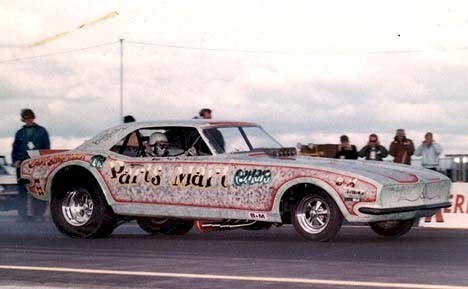
Kip Brundage was better than many of the leaker funny cars that appeared
in the late ‘60s. The Parts Marts Camaro debuted in 1967 with an
injected Chevy Rat. Brundage drove the car until 1970, which is
approximately when this photo was taken. The team switched to a
supercharged Chevy L-88 427 by this time. Note the use of the old school
Hilborn injector, which many had stopped using by this time. The Northern
California team rarely came south, opting to race at NoCal tracks such as
Fremont and Sacramento.
The
team’s best outing was the 1970 Governor’s Cup race at Sacramento
Dragway. Brundage ended the race as runner up to the “Snake.” The
Parts Mart car’s unique paint scheme was done with the help of famed
drag racing filmmakers, the Jackson Brothers. Jamie Jackson took a candle
and allowed the smoke to permeate the wet paint. The process caused a
weird frosted cobweb design. The car finally ran in the 7.40 range at 195
plus before being retired. Parts Mart also sponsored an injected altered
and dragster along with this funny car. (Photo by Drag Racing Memories;
notes by Bill Duke)
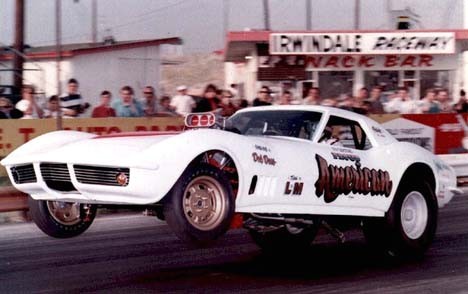
Ed Carter was from the Northern California area. He began racing funny
cars after buying Steve Bovan’s Chevy II in 1966. Carter ran the car
under the “Chevy II Heavy” banner for a couple of years. He dropped
out of racing for year or so, then returned to the funny car wars in 1969
with the “Young American” Corvette. While sorting out the car, Ed
raced mostly in Northern California. He traveled to Southern California
when the car started running sevens and was able to qualify for the open
SoCal shows.
Booked
in shows were rare for the Southern California area and cars had to
qualify to earn their money. The car began with a Chevy Rat engine built
by Del Doss of Brooks and Doss dragster fame, but Carter switched to a 392
Chrysler before retiring. Ed used Rick Guasco’s engine out of the
“Pure Hell” AA/FA, and the night’s winnings in netted more money for
Guasco than the last race he’d attended with the altered. This prompted
Guasco to build a funny car of his own. The “Young American” was raced
throughout the 1970 season. (Photo from Drag Race Memories; notes from
Bill Duke and Danny White)
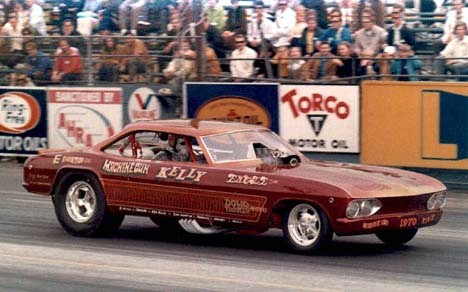
Barry Kelly was one of several
African American funny car racers that
raced out of Southern California during the ‘70s. He debuted the
beautiful candy apple red “Machine Gun Kelly” Corvair in 1970. The car
was built by Exhibition Engineering, the same shop that built the Pisano
Bros.’ Corvair. Kelly’s car featured a supercharged Chevrolet Rat
Engine with a Hilborn injector. Fellow funny car racer Doug Thorley was an
associate sponsor on this car. The car was a fusion of steel and
fiberglass, making it too heavy by the end of 1970. Kelly parked the car
by the end of the year after running seven-second times.
Kelly
returned a couple of years later with a new Hemi-powered “Machine Gun
Kelly” Vega in 1974. It was a mishap in the Vega that gave Kelly his
greatest claim to fame. While racing at the P.R.O. Nationals on Long
Island, the car caught fire. Kelly ran the Vega into the back of the
“Fireball Vega” with Paul Smith at the wheel. Kelly retired from drag
racing afterward. The photo of Machine Gun Kelly on fire is one of the
most recognizable photos of the 70s. (Photo from Drag Racing Memories;
info from Dale Pulde, Dennis Doubleday, Bill Duke, and Danny White)

The "Holy Toledo” might have been as aerodynamic as a brick, but it
was tough to beat. It was built by Ed Lenarth and Brain Chuchua in late
1968 after the breakup of the ‘Secret Weapon” team of Roger Wolford
and Lenarth. The ‘Secret Weapon” had proven itself to the point that
Jeeps were banned from legal funny car action. The new “Holy Toledo”
was built with state of the art equipment of the time. It raced in open
SoCal races and match races. Roger Wolford left to drive the “Mako Shark
Corvette, leaving Lenarth to drive for himself.
Ed could
hang with the best California had to offer at that time. According to the
Draglist.com files, the best times for the car were a tough 7.37 at 197
mph. The ”Holy Toledo” Jeep was raced until 1971. The car that
replaced it was even wilder, a rear engine sidewinder Gremlin. Bob
Hightower wrecked the car before the body was done. Lenarth retired from
asphalt drag racing and took the Jeep to the dirt. The car was a winner on
the sand, too. It was finally retired from the sand to sit outside
Lenarth’s shop. In 2004, Lenarth restored the car to 1970
specifications. (Photo from Drag race Memories; info from Draglist.com
files)
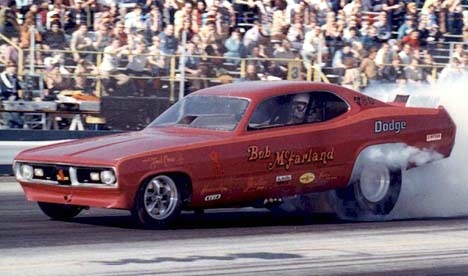
Bob McFarland had a short but memorable funny car career from 1968 to
1971. He began with the “Mastercharge” Nova that featured a Chevrolet
Rat engine backed by an automatic transmission. In 1970, McFarland rebuilt
the Nova and had his best year in racing. The car won the Arizona State
Championships at Beeline Raceway and the biggest funny car race of the
year, the Manufacturer’s Race at Orange County. The win by McFarland has
been considered by some the biggest upset in funny car history. The Nova
ran sevens all night to beat a 100 plus car field.
The
money earned with this win, plus the sale of the Nova, allowed McFarland
to build this new Dodge Demon. The Demon was a state of the art car. It
had the latest Chrysler Hemi engine and clutch setup inside a new style
dragster chassis that funny cars were beginning to use. The car ran low
sevens until it was destroyed in a fire at Lions. Mickey Thompson pulled
McFarland from the fire. The fire and loss of his new car prompted Bob to
retire from racing. (Photos from Drag Racing Memories; info from Bill Duke
and Draglist.com Files)
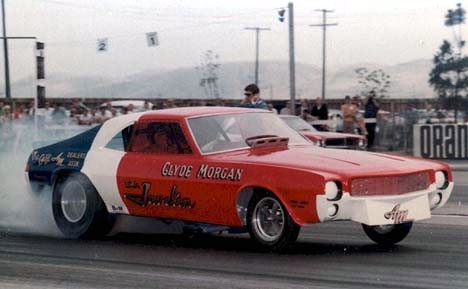
Clyde Morgan’s “Exp. Javelin” was one of a handful of AMC funny cars
that raced during the late sixties and early seventies. The car was built
in 1969 by Fletcher chassis with a full suspension. The Southern
California American Motors Dealers Association sponsored the “Exp.
Javelin.” The valve covers read “AMC,” but a 427 Chevrolet Rat
really provided the power. The car’s known best time was a 7.49 at a
strong 200.35 mph. It was one of first funny cars to break the 200 mph
barrier. This was Morgan’s best-known ride and the only one he toured
with. Morgan also drove Charlie Wilson’s “Vicious Vette,” Dickie
Harrell’s Camaro, and Tom Sturm’s “Just 4 Chevy Lovers” Corvair.
The “Exp. Javelin” was moderately successful until the end of the 1970
season. Morgan built a new Trans Am in 1971 but retired soon afterward.
(Photo from Drag Racing Memories; notes from Draglist.com files)
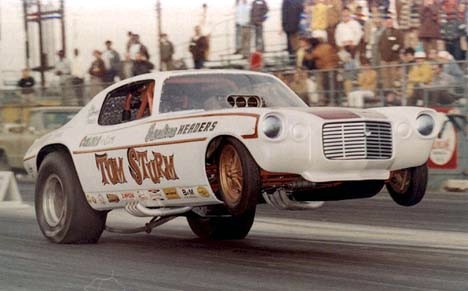
Tom Sturm was one of the first funny car racers in the United States. The
“Just 4 Chevy Lovers” Chevelle was a fan favorite. Sturm shared the
driver’s seat with famous racers such as Bob Churchill, Tom Jacobsen,
Mark Bullet, Bob Smith, Gordon Mineo, Clyde Morgan, and Dale Armstrong.
When Sturm rebuilt the “Swapper” into this Camaro, he took over the
driver’s seat again. The Camaro’s success was limited, running in the
seven-second range with speeds in the upper 190s. The old style space
frame chassis was too heavy compared to the new John Buttera style
dragster chassis his competitors were using. Sturm crashed this
Camaro at Lion’s Drag Strip. His last funny car in 1973 came complete
with a roof-mounted, top fuel-style wing. The new Camaro, like this one,
was not as successful as his early rides. (Photo from Drag Racing
Memories; info from Bill Duke and Draglist.com files)
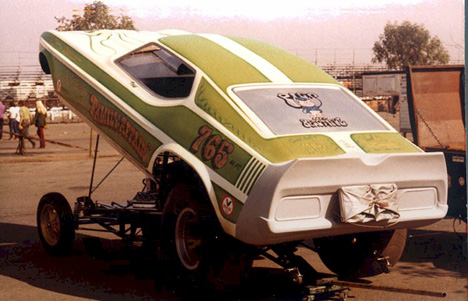
Tom Zedaker was among a handful of low-buck funny racers that raced in the
Southwest during the early seventies. Zedaker’s funny car career was
short, lasting two to three years at best. Tom worked as a peace officer
in Nevada to support his racing team. The “Family Affair” Mustang was
the second flopper raced by the Zedaker team. The first car, the
“Trouble Maker II” Camaro, was raced in 1971. Zedaker’s best finish
was making it to the finals at a Sacramento Raceway Division 7 race. The
“Family Affair” featured a 392 Chrysler in the soon to be outdated
space frame chassis design. The car ran into the seven-second range.
Zedaker left funny car racing by 1973. (Photo from Drag Racing Memories;
text from Draglist.com files and Bill Duke)
[ Back ] [ Home ] [ Next ]
|
